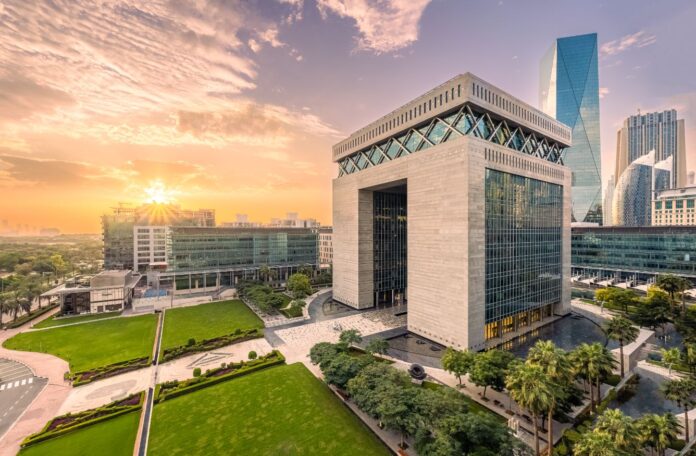Dubai International Financial Centre (DIFC), the leading global financial hub in the Middle East, Africa, and South Asia (MEASA) region, continues to drive its actionable commitment towards climate change by implementing pledges made by finance industry stakeholders at the record-breaking COP28 UAE in December last year. The Centre reaffirmed its dedication to support the finance sector, moving beyond pledges and into positive outcomes at the ‘100 Days from COP28: Commitment to Action’ event, co-hosted in partnership with the Global Ethical Finance Initiative (GEFI).
Sustained Collaboration: 100 Days from COP28
Having successfully collaborated on ‘Path to COP28’, a global finance-focused campaign for COP28, DIFC and GEFI jointly hosted the event to ensure that stakeholders in Dubai and the UAE follow through on the momentum generated at COP28 by turning their climate commitments into transformative actions. Several UAE-based financial institutions and financial services stakeholders joined the event to reflect on the progress made, share insights, and highlight the practical actions they are taking to support the UAE’s green economy transition.
Alya Al Zarouni, Chief Operating Officer, DIFC Authority, and Chris Tait, Chief Operating Officer, GEFI, welcomed guests at the ‘100 Days from COP28’ event while finance and banking sector industry leaders outlined the progress made in executing the Dubai Sustainable Finance Working Group (DSFWG) roadmap and the AED 1trn Sustainable Finance pledge. The event also highlighted the progress made by DIFC and its affiliates, particularly in knowledge-building and ESG policy development.
Knowledge-Building and Finance Fundraising: Sustainable Finance Catalyst
At COP28, more than USD 80bn in climate finance commitments were made by countries, development banks, private sources, and philanthropists, while DIFC announced the launch of its Sustainable Finance Catalyst, a strategic initiative to grow sustainable finance flows from Dubai to USD 100bn by 2030. Other targets of the initiative include enabling 1mn future sustainability leaders by providing easy access to curated training programmes, toolkits, networking opportunities, and events, while shaping the future of finance by growing DIFC-based, sustainability-driven start-ups 50x by 2030. As a strategic partner, GEFI will be the catalyst’s implementation partner, which will see the launch of an AI-driven knowledge hub.
Drawing on lessons from Scotland’s COP26 legacy, Christian Kunz, Chief Strategy, Innovation and Ventures Officer, DIFC Authority, and Omar Shaikh, Managing Director, GEFI, outlined the progress of the SFC in scaling sustainable finance flows from Dubai and called for strengthening Dubai’s position as a sustainable finance hub by empowering more finance organisations and upscaling finance flows towards the global south.
DFSA issues first ESG Fee Waiver for sustainability-related debt-issuance
As part of its strategy to encourage greater volumes of sustainable investments, and in alignment with the Sustainable Finance Catalyst, DFSA issued its first ESG Fee Waiver for sustainability-related debt-issuance to Emirates NBD Bank PJSC, illustrating the independent regulator’s commitment to innovation and its impact on the financial landscape. Following an announcement by DFSA during COP28, all regulatory fees for issuers listing sustainability-related debt securities in DIFC throughout 2024 would be eligible for the waiver.
DIFC signs MoU with Climate Bonds Initiative (CBI)
As a strategic partner of the Sustainable Finance Catalyst, DIFC’s recent MoU with CBI includes the establishment of a regional office to enhance market awareness, and the development of Green Sukuk Standards (GSS), a form of standardisation developed in conjunction with the Dubai Sustainable Finance Working Group (DSFWG) covering water, bioenergy, low carbon buildings, land transport, shipping, solar, wind and waste management. Considered a viable mechanism to help increase the credibility of responsible Islamic investing, the partnership could equally prove effective in benchmarking tools for syndication and the development of asset and wealth management products. Forging an integral part of the SFC, both parties have also jointly developed a calendar of events focused on transition finance, leading to a “Transition Dialogue” side-event at this year’s Future Sustainability Forum, taking place in Dubai for the second time on 4 – 5 December 2024.
Commenting on the latest developments, Alya Al Zarouni, Chief Operating Officer, DIFC Authority, said: “As we reflect on the legacy of COP28 and the milestones achieved during the ‘Path to COP28’ campaign, it is evident that translating commitments to action requires the concerted efforts and collaboration of a diverse range of partners and stakeholders. The strong interest from the industry to deliver on the promises made at COP28 through DIFC’s Sustainable Finance Catalyst is a strategic step in this direction and exemplifies our unwavering commitment to drive tangible progress towards a low-carbon economy and a climate-resilient future.”
Omar Shaikh, Managing Director, Global Ethical Finance Initiative, said: “Our partnership with a world-class financial centre like DIFC has been pivotal in encouraging and supporting financial institutions in transitioning from commitment to actual implementation, measurement, and reporting. We look forward to engaging with other senior members in the local, regional, and international financial landscape to make a difference in environmental awareness and achieve COP28 targets.”
Through its chairmanship of Dubai Sustainable Finance Working Group, DIFC is also enabling UAE businesses to build climate change resilience while supporting the wider economy’s journey towards Net Zero.











